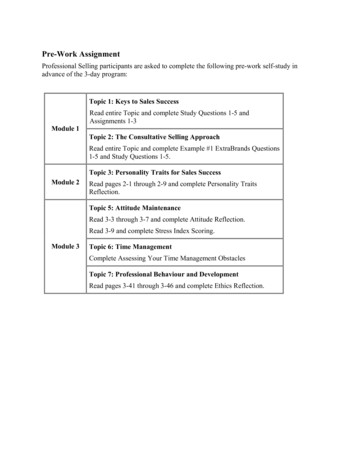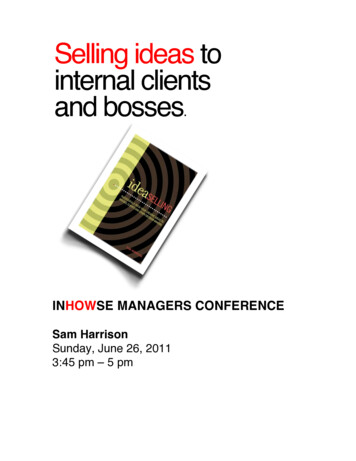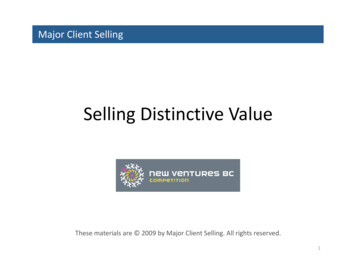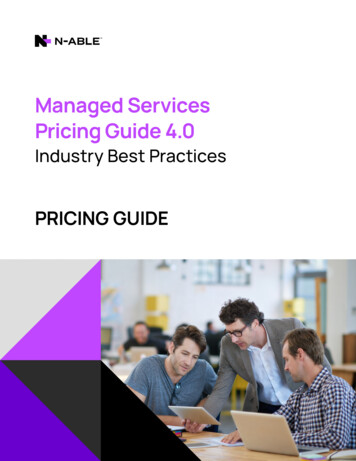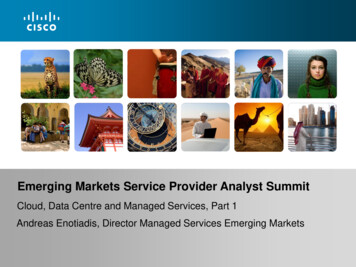
Transcription
A guide to sellingmanaged servicesVoIP and unified communications
A guide to selling managed services: VoIPand unified communicationsVARs, like the technology vendors they partnerContentsHow to become amanaged servicesproviderHow to sell managedVoIP servicesHow to offer hostedunifiedcommunications andcollaboration serviceswith, are under increased pressure to find new revenuestreams as their customers are stuck with flat IT budgets. Soit's no surprise that a growing number of VARs areconsidering the transition to managed service provider(MSP).Whether by building out new technology to offer remotenetwork and application management or reselling adistributor's managed services, VARs are working to launchannuities-based businesses as quickly as possible.The good news for VARs is that despite the fact that today'smacro-economic indicators are distressing to mostbusinesses, MSPs find this economy to be unusuallyfavorable. As IT organizations downsize or are expected to domore with the same staff, they have no choice but to turn tothird parties to help them accomplish their requirements.But VARs have to approach the market swiftly andstrategically since the MSP business model is attracting moreand more companies, and competition is becoming moreintense. It's crucial for successful MSPs to stand out from thecrowd by offering a full suite of services, from the most basicto the most advanced.In this guide, we'll take a look at the reasons for becoming amanaged services provider and some advice for addingmanaged services to your offering, then drill down into somespecific advice for offering managed VoIP and hosted UCC.Page 2 of 15Sponsored by
A guide to selling managed services: VoIPand unified communicationsHow to become a managed services providerContentsHow to become amanaged servicesproviderHow to sell managedVoIP servicesHow to offer hostedunifiedcommunications andcollaboration servicesThe transformation from VAR to managed service provider can seemdaunting, especially for the smaller, more specialized reseller. Beforeconsidering the move, VARs need to understand the business drivers behindan organization's decision to use managed services and which services arein demand (read "most profitable").There are common triggers and business drivers that lead companies downthe managed services path. One major trigger is the need to control costs inresponse to decreasing budgets and staffs. Companies are scrutinizing ITexpenses and find benefit with the predictability of managed services.Managed Services TriggersReduction in StaffReduction in BudgetApplication ComplexityNew TechnologyIncreased Number of Virtual Workers Change in ManagementNew Business InitiativeHardware End of LifeMerger or AcquisitionIncreased Regulatory RequirementsFigure 1: Managed Services Triggers (Source: Nemertes Research, 2009)What managed services are customers seeking?Nemertes Research recently conducted a benchmark study in which wespoke with more than 200 IT practitioners regarding their organizations' plansfor managed services. Among those using managed services, the top fiveservices of interest were:Storage, back-up and disaster recoveryNetwork monitoringSecurityIP telephonySoftware as a Service (SaaS)Page 3 of 15Sponsored by
A guide to selling managed services: VoIPand unified communicationsOther services of interest were managed desktop/help desk support,managed UC, and managed network optimization.ContentsHow to become amanaged servicesproviderHow to sell managedVoIP servicesHow to offer hostedunifiedcommunications andcollaboration servicesWe've watched adoption of managed services rise dramatically over the lastfew years, to 33% of companies in 2008 from 6% in 2005, 14% in 2006 and22% in 2007. Organizations that would not have considered outsourcingeven a year ago are evaluating, and those that were using these services areextending them to more of the organization. Also, many companies usingmanaged services have grown to use an average of four services.Turning to your vendor for help in becoming a managed servicesproviderUntil now, various managed services have fallen to specific segments ofproviders, usually for technical reasons -- or sometimes because theyseemed a better business model fit. Carriers, for example, frequently offernetwork-based services such as router management, WAN management andimplementation. System integrators focus heavily on design andimplementation, whereas outsourcers address network, security orapplication management. Vendors and their resellers typically offerassessment, installation, training, break/fix/truck rolls and ongoingmanagement.But as VARs look to expand into offering a variety of managed services, theymay be able to turn to their existing vendors for help. Some vendors such asCisco and Microsoft have partner incentive programs specifically basedaround offering managed services.Others, including Cisco, Avaya, Juniper and Microsoft, have strong programsin place to help MSPs with training, marketing and financing. Trainingfocuses on both technical (often including certifications) and sales. Thesevendors also offer marketing funds typically based on volume. More recently,some vendors have extended financing programs beyond hardware andsoftware, to include services. That way the MSP is able to extend variousfinance options to its customers.Page 4 of 15Sponsored by
A guide to selling managed services: VoIPand unified communicationsReselling services: An easier transition to becoming a managedservices providerContentsHow to become amanaged servicesproviderHow to sell managedVoIP servicesHow to offer hostedunifiedcommunications andcollaboration servicesDistributors and master MSPs also offer programs to ease the transition fromVAR to MSP. Ingram Micro Corp. offers the Seismic Managed Servicesprogram, an online platform and back-up service that MSPs can use forremote desktop monitoring, management and other select services. Synnexalso offers an on-demand solution for multiple areas -- business continuityand disaster recovery, security, VoIP, managed help desk, and more.These solutions and others like them are an easier, turnkey way of gettingstarted with little up-front investment because they offer a monthly pay-asyou-go subscription model. Normally, with this type of partnership, VARs paythe standard license costs for use of the application, along with an additionalmonthly hosting fee. VAR markups then vary widely but typically rangeanywhere from 20% to 80%.In another business model, Do IT Smarter offers an Instant-MSP programthat allows VARs to sell managed services to their customers while Do ITSmarter runs the backend infrastructure. When partnering with a masterMSP, VARs typically manage their daily customer relationships and handlesituations that call for onsite remediation. This allows them to build up trustas they build out their offerings. This type of relationship is similar to workingwith a distributor, as the MSP will pay a monthly fee that it will mark up whenpassing along to the end customer. Also, some master MSPs will charge aonetime sign-up fee.Building out your own system to become a managed services providerVARs that choose to independently pursue managed services need to selecta delivery platform. These platforms consist of the hardware and softwareused to deliver network-based services and applications and allow providersto remotely monitor and manage hardware and software (including upgradesand patching). They also often include very detailed reporting capabilitiesthat allow customers to easily access reports via the Web.Page 5 of 15Sponsored by
A guide to selling managed services: VoIPand unified communicationsCarriers and larger systems integrators typically use their own platforms forremote monitoring and management, whereas thousands of local andContentsHow to become amanaged servicesproviderHow to sell managedVoIP servicesHow to offer hostedunifiedcommunications andcollaboration servicesregional VARs tend to use management products from the vendormanufacturers, as well as third-party management tools and platforms fromcompanies such as Kaseya, N-able and Level Platforms. These tools canprovide information on multiple vendors.Depending on the types of managed services offered, MSPs may use a thirdparty platform along with a combination of specialty management tools. Forexample, MSPs often have a standard platform they will use for basic remotedesktop/server management, and they will then add additional specialty toolsfor VoIP management, optimization, and so on.Understanding the differences between platforms and assessing which willbest suit your needs will take time and effort, but you don't have to go italone. There are numerous excellent resources for MSPs, including the MSPAlliance and MSP Partners, which offer training, certification and guidance toVARs making the leap to managed services.The keys to success as an MSP include solid customer service, technologyexpertise, fair pricing and flexibility. Never assume that a one-size-fits-allapproach will go very far. While it's acceptable to package some commonservice types, it's imperative to be flexible and customized in the serviceofferings available.The market is ripe, and it will become more competitive as it continues togrow. The cream of the crop will focus on differentiating their serviceofferings by providing a full menu of options, from the most basic service tothe most advanced mix of services. Be sure to reach out to vendors,distributors and master MSPs for assistance with partnerships, training,certifications and support.Page 6 of 15Sponsored by
Public Sector EnablementPublic Sector is in Our DNANavigating the Public SectorGovernment Contract Departmenthas over 40 years combinedexperience in governmentcontractingLet the experts at Comstor help you navigate the Public Sector market.As Cisco’s original federal distributor, Comstor has been selling into thePublic Sector since 1993. An authorized GSA Schedule holder for Ciscoproducts, Comstor offers a fully integrated Public Sector marketingteam with experts in each of the applicable sub-verticals: State & Local,Education, Federal, and Healthcare.How We Do It Comstor has been an authorized GSA Schedule holder for Cisco productssince 1997. Go to www.gsa.westcon.com for more information. We have an average of 10 years of experience on our GovernmentContract and Public Sector Marketing teams. Our Cisco Certifications/Specializations courses include: Step Up to CiscoSelect, Step Up to Cisco Premier, Step Up to Cisco UC, and Step Up toCisco Express UC. Comstor Consulting Services for Public Sector Partners include:Healthcare Grant Writing Initiative, EDU Opportunities, Discovery/Development, Federal Capture Management. We generate leads and uncover opportunities through:– Tier 3 and 4 Marketing Enablement– Funded Lead Identification– E-Rate Lead IdentificationComstor provides marketingsupport for the following sectors:State & Local, Education, Federaland HealthcareFor more information, please contact:Rich Bue, Comstor Federal Business Development Managerrich.bue@comstor.comPh: 703-403-1577
A guide to selling managed services: VoIPand unified communicationsHow to sell managed VoIP servicesContentsHow to become amanaged servicesproviderHow to sell managedVoIP servicesHow to offer hostedunifiedcommunications andcollaboration servicesThe past year has been a growth year for managed service providers (MSPs)despite the troubled economy. In fact, unlike vendors and pure-playhardware resellers, many MSPs experienced growth because of currentmacroeconomic trends.One of the top growth areas for MSPs is offering managed VoIP services.Among organizations using MSPs, 33% used them for VoIP services, upfrom 22% last year, 14% in 2007, and 6% in 2006.Why the need for managed VoIP services?Most businesses are in the process of evaluating, implementing, or operatingIP telephony systems and VoIP throughout their WANs. But while they'reaggressively rolling systems out, they face huge challenges when it comes toeffective monitoring and management. That's because as enterprise demandfor communications support increases, IT budgets remain flat or evendecrease. What's more, headcount within the overall IT department isstagnant or decreasing, forcing companies to do more with less.The problem is that when it comes to VoIP, there must be telephony-stylequality of service (QoS). There is no time for lost packets and stalledcommunications. Previously, companies addressed IP telephonyperformance problems by assigning more staffers to monitoring andmanagement. That was when these companies had budgets to hire expertsand staff to troubleshoot problems.With flat budgets, companies generally adopt one of two approaches: Somebuy specialty IP telephony management tools to make sure the existing staffcan isolate and resolve problems accurately and efficiently. Others rely onthird-party MSPs to monitor and manage the system and troubleshoot userproblems.MSPs are in a particularly good spot now because many enterprises arerealizing it's not so easy to manage VoIP networks and applications in-Page 8 of 15Sponsored by
A guide to selling managed services: VoIPand unified communicationshouse. Network managers are often shocked to discover how many tools arerequired. Companies typically buy anywhere from one to six additionalContentsHow to become amanaged servicesproviderHow to sell managedVoIP servicesHow to offer hostedunifiedcommunications andcollaboration servicesmonitoring products (with the average being two) to effectively manage theirIP telephony services. These include tools to address configuration, networkand application performance, asset and change management, and eventcorrelation.What's more, network managers find that while many IP PBX vendors suchas Alcatel-Lucent, Avaya, Cisco, Mitel, Nortel, ShoreTel, and Siemens offervarying levels of management and monitoring with their products, customersmust still supplement these with third-party tools. Making matters worse,customers often come to this realization 24 to 36 months after going intoproduction.What kind of MSP do customers want for managed VoIP services?That's when customers tend to turn to MSPs. And they tend to depend onsmaller, regional MSPs to deliver managed VoIP services. In fact, 60% oforganizations with fewer than 1,000 employees turn to regional MSPs. Why?They prefer the local presence and security of knowing an expert can be onsite quickly. Furthermore, they view the MSP as an extension of their IT staff-- which isn't always the case with large, global MSPs.MSPs must offer diverse tools to manage multi-vendor networksRegardless of whether MSPs are regional or global, they must be able tomonitor and manage multi-vendor networks and applications.Many MSPs, including global carriers such as AT&T, BT, Orange BusinessServices and Verizon, as well as large systems integrators such as EDS andIBM, use their own platforms to remotely monitor and manage IP telephonyand unified communications (UC) systems. For example, Verizon uses itsown Impact platform to remotely monitor and manage not only the WAN, butcustomers' UC systems.Page 9 of 15Sponsored by
A guide to selling managed services: VoIPand unified communicationsOften, they augment those systems with third-party tools from vendors suchas Fluke Networks, Infovista, Integrated Research (Prognosis), NetIQ, andContentsHow to become amanaged servicesproviderHow to sell managedVoIP servicesHow to offer hostedunifiedcommunications andcollaboration servicesNetQoS. Smaller local and regional VARs tend to use management productsfrom the vendor-manufacturers, as well as some of the third-partymanagement tools that can provide information on multiple vendors.The ability to monitor multiple vendors' systems will become critical, as it isunlikely that businesses will use only one vendor's system forever. Also,large organizations may never have a single vendor. Though somecompanies are staunch single-vendor shops, as IP telephony becomes onlyone component of vast unified-communications architecture, multi-vendorsystems will become unavoidable. In addition, mergers and acquisitions oftenbring along a new set of vendors, and while they may be supplanted by thestandard platform, the next acquisition just restarts the cycle.Bundling VoIP and unified communications servicesBecause VoIP is such an integral part of UC, it is likely that MSPs will do wellby combining service offerings for the two sets of applications. We expectmore organizations to rely on service partners to assist with the monitoringand management of their UC infrastructures. In fact, half of the ITprofessionals we work with state that UC-professional services are vitallyimportant because UC adds more network complexity, and real-timeapplications bring along requirements for increased bandwidth and stringentQoS guarantees.MSPs have the opportunity to create competitive advantage by exceedingenterprise management and reporting requirements for VoIP and UC. To doso, they should promote and bundle network services to supportcollaborative applications and application optimization.The bottom line is that providers should be comfortable with multiple vendorsthat arm themselves with tools allowing them to offer better QoS to improvethe experience for users. Their offerings should enhance services, not justmanage the application.Page 10 of 15Sponsored by
A guide to selling managed services: VoIPand unified communicationsHow to offer hosted unified communications andcollaboration servicesContentsHow to become amanaged servicesproviderHow to sell managedVoIP servicesHow to offer hostedunifiedcommunications andcollaboration servicesOffering hosted unified communications and collaboration services is astrong opportunity for MSPs as they evolve their portfolios, but there arechallenges too. MSPs often must scale hosted unified communications andcollaboration (UCC) services to the large enterprise and provide the kind ofcustomizable applications available through on-premise solutions.What's clear is the potential demand for hosted UCC. Recent research fromNemertes shows that 52% of organizations are interested in Software as aService (SaaS), suggesting that now is the perfect time for MSPs to expandtheir hosted offerings.Companies looking to save money will turn to hosted UCC services sincethey offer all the technical advantages of on-premise UCC applicationswithout the large capital investment. In the hosted scenario, the hardwareand applications software sit at the provider's data center, where all of themanagement and monitoring also take place. For customers, that means noneed to purchase equipment except for VoIP phones or cameras for videoconferencing. Even then, some service providers lease all the hardware.What's more, hosted UC services enable enterprise users to take advantageof redundancy and backup that would be costly to maintain on premise. Asthe service provider, you handle implementation, configuration andcustomization, and then updates and enhancements over time. Yourcustomers simply pay the monthly bill.Hosted unified communications and collaboration services for the largeenterpriseIn the past, Nemertes saw primarily small and medium-sized businesses(SMBs) under 1,000 seats buying hosted UCC services. This wasn't for lackof demand from large enterprises but because most of the hosted servicesavailable didn't scale to meet their demands. Those that did provide servicesto the enterprise often did not have the global coverage required. We expectPage 11 of 15Sponsored by
A guide to selling managed services: VoIPand unified communicationsthat to change and already see more large enterprises evaluating andadopting services as providers expand their offerings and global reach.ContentsConferencing leads the way in collaboration servicesHow to become amanaged servicesproviderAlthough organizations of all sizes can be slow to adopt some hostedHow to sell managedVoIP servicesHow to offer hostedunifiedcommunications andcollaboration servicesservices, such as VoIP, that is not the case when it comes to audio, videoand Web conferencing. Sixty-one percent of the organizations that Nemertesworks with use hosted Web conferencing. There is also much interest inhosted audio and video conferencing.An organization's decision to use a hosted Web conferencing tool instead ofoperating its own Web conferencing server is often based on cost and theability to easily support external participants. This is especially true for SMBsthat may have limited staff and budget to manage an internal server.Easy roads to hosted unified communications and collaborationservicesWithin the past couple of years, software-centric providers began makingforays into offering hosted UCC applications -- and asking partners to drivesales. Microsoft, IBM and Google have expanded their collaborative emailand calendaring offerings to include additional communication services. Toattract and assist resellers, they've designed strong training programs. Allthree companies have developed on-line tools and resources and offertraining to support MSP sales efforts.The problem with hosted VoIPThere has been strong enterprise interest in hosted conferencing and othercollaboration/communications services, but we still haven't seen anywherenear that level of interest in hosted VoIP. Hosted VoIP is used by only about12.2% of organizations overall, while about 20% of SMBs say they're usingthe services.Page 12 of 15Sponsored by
A guide to selling managed services: VoIPand unified communicationsSMB uptake may be flat because of an increased number of VoIP-technologyvendors that now have in-house solutions aimed at smaller companies.ContentsHow to become amanaged servicesproviderHow to sell managedVoIP servicesHow to offer hostedunifiedcommunications andcollaboration servicesSMBs that were once scared off by the seemingly complex VoIP systemsnow have choices that are almost plug-and-play solutions.For larger enterprises, cost is often the biggest drawback to using hostedVoIP, followed by lack of service in their geographical locations. The averagecost per user per month for hosted VoIP is 45. When comparing that withthe cost of purchasing and operating an on-premise solution, it becomesapparent why most large organizations do not find it cost effective.For that reason, many regional MSPs do not sell hosted VoIP solutions, nordo they want to. The bigger moneymaker for them is selling an on-premisesolution and wrapping managed services around it.Best practices in offering hosted unified communications andcollaboration servicesMSPs that want to offer hosted UCC services for both the SMB andenterprise market must understand user concerns and the perceiveddrawbacks of SaaS. Nemertes recommends using the following bestpractices to address these concerns up front with potential clients:Flexibility and customization: Often a hosted service has lessflexibility and fewer options in configuring the system. Also, upgradesusually wait until the provider is prepared to offer them. Differentiateyourself with customization and integration services.Global coverage: Many hosted providers (especially VoIPproviders) still do not offer the coverage area required for companieswith global locations. Success with dispersed organizations willdepend on your ability to offer services for all locations.Security: Concern regarding security is still cited as one of theprimary drawbacks to a hosted solution. As the customer's trustedadviser, an MSP needs to build customer confidence and ensure thereliability of the SaaS applications, while also ensuring data securityand availability.Page 13 of 15Sponsored by
A guide to selling managed services: VoIPand unified communicationsContentsHow to become amanaged servicesproviderWhether you're new to managed services or ready to expand, rememberthis: The successful MSP will build on the SaaS offering to develop solutionsfor implementation, integration, customization, migration and training, as wellas provide ongoing management to build recurring revenue opportunities.Katherine Trost is a research analyst at Nemertes Research, where shefocuses primarily on professional services.How to sell managedVoIP servicesHow to offer hostedunifiedcommunications andcollaboration servicesPage 14 of 15Sponsored by
A guide to selling managed services: VoIPand unified communicationsContentsFree resources for technology professionalsTechTarget publishes targeted technology media that address your need forHow to become amanaged servicesproviderinformation and resources for researching products, developing strategy andHow to sell managedVoIP servicesanalysis and the Web’s largest library of vendor-provided white papers,How to offer hostedunifiedcommunications andcollaboration servicesmaking cost-effective purchase decisions. Our network of technology-specificWeb sites gives you access to industry experts, independent content andwebcasts, podcasts, videos, virtual trade shows, research reports and more—drawing on the rich R&D resources of technology providers to addressmarket trends, challenges and solutions. Our live events and virtual seminarsgive you access to vendor neutral, expert commentary and advice on theissues and challenges you face daily. Our social community IT KnowledgeExchange allows you to share real world information in real time with peersand experts.What makes TechTarget unique?TechTarget is squarely focused on the enterprise IT space. Our team ofeditors and network of industry experts provide the richest, most relevantcontent to IT professionals and management. We leverage the immediacy ofthe Web, the networking and face-to-face opportunities of events and virtualevents, and the ability to interact with peers—all to create compelling andactionable information for enterprise IT professionals across all industriesand markets.Related TechTarget WebsitesPage 15 of 15Sponsored by
network and application management or reselling a distributor's managed services, VARs are working to launch annuities-based businesses as quickly as possible. The good news for VARs is that despite the fact that today's macro-economic indicators are distressing to most businesses, MSPs find this economy to be unusually favorable.
